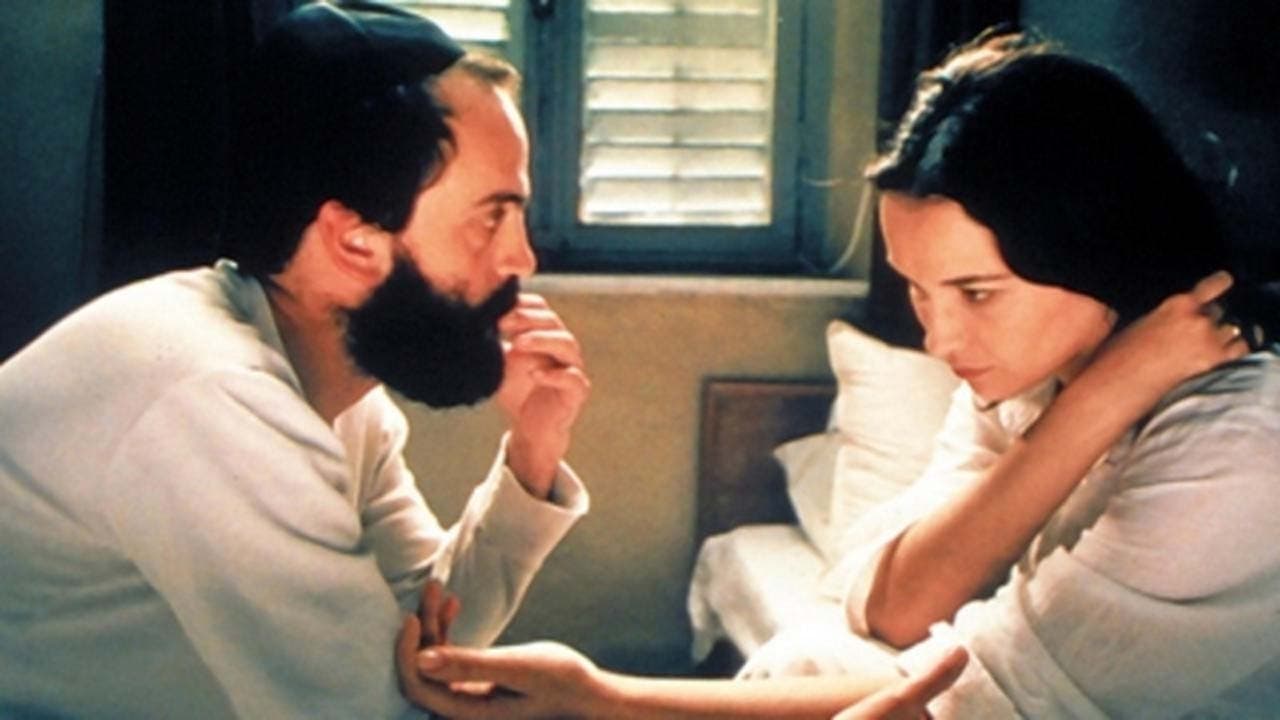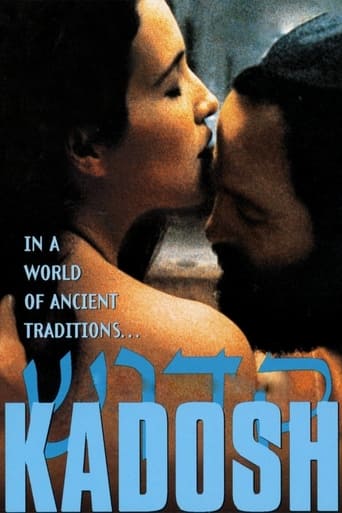Laikals
The greatest movie ever made..!
Boobirt
Stylish but barely mediocre overall
NekoHomey
Purely Joyful Movie!
OrrinBob
'Kadosh' is a tragedy; the tragic hero is Meir, who is induced or forced to divorce his wife Rivka because she is barren for 10 years. A lesser tragic hero is his sister-in-law Malka, who is forced into a loveless marriage with the fanatic Yussuf, who beats her because she is deceptive and unfaithful. The main actors did great jobs--the love of the sisters at the end was amazingly portrayed. The point of the film--that ultra-orthodox Judaism is misogynistic--is made with considerable nuance if not balance, and the world of ultra-orthodoxy is explored intriguingly, if not always clearly for a non-Jew.I am writing this review mainly because of disdain for some other reviewers' defense of the ultra-orthodox practices and beliefs critiqued by this film. (Perhaps it needs saying that no, I'm not an anti-Semite--I even believe, despite my preference for separation of church and state, that a _Jewish_ state of Israel _needs_ to exist, as a haven from the deep-seated and contagious bigotry of other groups against Jews.) Reviewers complain that the film doesn't show the complexity or loving relations in ultra-orthodox families, and that it is biased toward secular or 'capitalist' (!) social currents.Now, in some ways, I agree: the film oversimplifies, and Yussuf is almost a caricature. (I never saw/heard a truck with loudspeakers extolling services during my short stays in Jerusalem or Tel Aviv, though I have--not extolling Jewish services--in Chicago.) Though I don't doubt for an instant that many powerful figures in religious and other institutions, in and out of Israel, are striking copies of him--for examples with less power, one need only turn on US talk radio. A work of art can be great and noble even though, and perhaps because, it makes characters overly simple and portrays actions unrealistically--I'll stop with 'Inherit the Wind' and 'To Kill a Mockingbird'.But talk about a secular or capitalist bias reveals the blindness of these reviews: no, the real contrast point to orthodox religion is individualistic democracy: the right of each member to be treated as basically equal, to choose their own beliefs and family practices (absent harm to others) without facing organized oppression, exclusion, or condemnation, and the requirement that important social institutions forswear bias and exclusion insofar as possible. A religion (or political party) that says blacks or gays or even women are second-class should face legitimate condemnation based on the clear evidence of history that it inevitably is rooted in fears and even more shameful emotions, and that it has soul-corroding consequences for everyone it involves.The problem with the negative reviews can be highlighted by comparing Kadosh with the recent film--'12 Years a Slave'. Defenders of slavery would surely complain that that film was very biased against the Southern plantation system, that many whites in it were caricatures, and that relations on Southern estates were complex, including lots of love and family warmth that nurtured blacks while ensuring that they fulfilled the important social function of producing more slaves to keep plantations going and free slave-owners for important cultural pursuits. I saw such arguments in the US even in the 1950s--vicious and ridiculous, surely, but more importantly they're beside the point--even if a social institution is a joy to the world, every human has the right to choose to oppose it, to live outside its norms if living so doesn't harm others, and every person has the right not to be brainwashed or mass-pressured into forgoing real alternatives to those institutions.
yespat
This is the film to see if you want to commit suicide but feel you're just not depressed enough to do the deed.Everything about the film is well done. Looks good, music is nice. The religious scenes have a documentary feel. It's hard to imagine that they did not film actual people in actual settings. (Maybe they did.) Anyway, this film is unremittingly depressing with no end in sight. It forces one to think that anyone who lives the Hassidic life is insane (and maybe they are, I don't know because I don't know any Hassidics.) When the film was finally over and I saw where it was leaving off I felt really sad. So if you're wanting to be sad, here's your film.
noralee
My mother told me not to go to see "Kadosh" -- but who ever listens to one's mother? I was so turned off by it while I was watching I thought I must have lost my feminist credentials on the way into the theater, so I checked with card-carrying feminists the next day. No, they also thought it was much more an anti-Orthodox screed than a pro-feminist statement, painting the Orthodox as equal to the Taliban.While this Israeli movie is careful to show that the sect the story is about is the ultimate ultra-Orthodox Messianists, it is so nasty as to be unbelievable (plus that the non-fanatic Orthodox rock-'n'-roller(!) one of the sisters is in love with is incredibly sexy--even in Israel that must be fantasy).The theater was quite crowded, so there's a pent-up curiosity to see Israeli movies; too bad this vicious movie is the one getting wide distribution. This was almost enough to drive me back to insipid Hollywood romantic movies. (originally written 4/29/2000)
zardoz12
...if those people watch movies, that is. "Sacred" is the simple story of two Orthodox Jewish couples living in Jeruselem who are having problems with the lifestyle. The first, Liev and Rivka, are childless with Liev silently blaming Rivka. The second, Yossef and Malka, are a miserable match made by Malka's mother; Malka does not want to be married, and Yossef would rather be more comfortable driving about town in a truck with loudspeakers on it, imploring Jews to come to the run-down synagogue while handing out Orthodox liturature. The source of Malka's dislike of marriage lies with Yaakov, who used to study at the yeshiva with Liev and Yossef, but joined the army and drove a tank around Lebanon. She loves him, but cannot leave the group, or so she thinks. On top of this, the Rabbi is pressuring Liev to annul his marriage because he thinks Rivka is barren. The problem with "Kadosh" is the same one that "The Holy Land" suffers from: once the film introduces all the characters, you just know what is going to be the end result. I have to agree with the reviewers that Gitai takes one point (Patriarchy is bad) and beats it to death. Like other reviewers, I wish that Gitai would have shown us a little of the joys of Orthodox living, unless that is the director's other point, i.e., that being Orthodox is a lot like being an Objectivist. Definitely the bummer movie of 1999.

